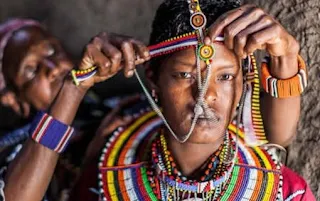White wedding dress got stained
 |
| A Maasai bride |
Over time, the iconic white wedding gown has started to fade into the background as more couples embrace the vibrant, meaningful traditions of African weddings. Once introduced by colonists during the so-called "dark ages," the white wedding became a standard across African nations. However, traditional African weddings, deeply rooted in culture and symbolism, never disappeared—they simply coexisted, resulting in multi-day celebrations filled with rituals and joy.
For decades, Western customs and ideals influenced African societies, leading to the loss of many traditions. Yet, the white wedding persisted as a hallmark of modern marriage. But today, a new generation of Africans is reclaiming their heritage. With a sense of pride, self-love, and identity, they are celebrating their roots unapologetically. From natural hair to melanin-rich skin to cultural customs, this wave of pride has challenged industries that once thrived on colonial beauty standards—like skin-bleaching products, chemical hair treatments, and even the traditional white wedding dress.
The Return to Tradition
African weddings are anything but ordinary. They are celebrations bursting with life, love, and cultural significance. Every step, every dance, and every act holds meaning. While some years ago many young Africans turned away from these traditions in favor of Western ceremonies, today, the tide is shifting. Pre-wedding activities, filled with food, music, and stunning traditional attire, are making a strong comeback. To skip the vibrant colors, intricate designs, and deep cultural significance of African weddings would be a disservice to their beauty and importance.
Here are some examples of African wedding traditions that showcase the rich diversity of the continent:
Kenyan weddings are a feast for the senses, with Maasai brides at the heart of stunning traditions. A Maasai bride wears a headdress handmade by her mother, each bead carrying symbolic meaning—from representing the groom’s wealth to the dowry paid to her family. The bride price, or lobola, is a heartfelt exchange of livestock, clothing, and honey. On the day it is paid, the bride shaves her head to symbolize a fresh start. Festivities then begin with dancing, singing, and the gifting of a new name by the groom’s family as a sign of acceptance.
Nigeria: Yoruba Weddings
If grandeur had a home, it would be at a Nigerian Yoruba wedding. Known for their opulence, these weddings feature stunning décor, dazzling attire, vibrant music, and nonstop dancing. A highlight of the ceremony involves the groom and his groomsmen lying flat on the ground before the bride's father—a touching display of respect and humility. The joyous celebration is fueled by tungba music, played live to keep spirits high throughout the event.
Zulu weddings are a riot of colours, beads, and rich tradition. The bride’s outfit is a masterpiece, featuring a short beaded skirt, vibrant beadwork on her chest, and a striking red hat that signifies her new status. Rituals include the exchange of gifts between families, the slaughter of livestock to symbolize provision, and acts like the bride brushing her husband's teeth to show her care. Music and dancing complete the celebration, making it a lively and deeply symbolic affair.
Ethiopia: A Royal Affair
Ethiopian weddings feel like stepping into a royal court. Brides and grooms don intricately embroidered garments, blending traditional African prints with elegant designs. Ceremonies, whether Christian or Muslim, are spiritual and grand. A touching moment involves the couple kneeling before their grandparents to receive blessings. This deep respect for family roots reflects the enduring importance of ancestry in Ethiopian culture.
Kikuyu weddings are as beautiful as they are meaningful. On the wedding day, the bride performs symbolic acts like combing the groom's hair, washing his feet, and trimming his nails—gestures that demonstrate her readiness to care for her husband. Pre-wedding rituals include the groom identifying his bride among a group of traditionally dressed women and exchanging goat ears as a promise to listen to each other throughout their marriage.
Beauty of African Weddings
No matter the culture, African weddings are deeply rooted in love, respect, and unity. From the symbolic beadwork of Maasai brides to the joyful dancing of Yoruba celebrations, each tradition is a testament to the continent's rich heritage. Whether your dream wedding is understated or extravagant, African weddings offer something truly unique—a vibrant celebration of love and identity.









Comments
Post a Comment